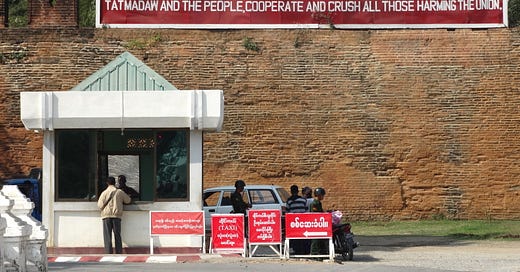Turkey’s Earthquake Legacy, Deterring China, Pakistan Elections, and More
This week at Inkstick Media.
Hello, everyone.
A little more than a year after one of the deadliest and most destructive earthquakes in Turkey’s history, Athens-based photojournalist Kyriakos Finas traveled to the country’s Hatay Province. There, he found people still living in container cities, destruction still piled up, and survivors struggling to cope with memories of a disastrous day and its aftermath.
Elsewhere, Bridget Moix and Hassan El-Tayyab recounted the lessons they learned on a recent trip to Israel and Palestine, where, they argue, the ongoing impact of the war on the Gaza Strip highlights the urgent need for a ceasefire.
That’s not all we’ve got at Inkstick. And if you’re not already, please follow us on Twitter, LinkedIn, Threads, Facebook, Instagram, and YouTube.
“After the Earthquakes: A Year of Optimism and Despair in Turkey” by Kyriakos Finas (Feb. 12)
On Feb. 6, 2023, an earthquake ripped across Turkey and Syria, leaving destruction in its wake. Tens of thousands died, buildings and homes collapsed, and many were left homeless. A year later, many are still rebuilding their lives in the wreckage.
“Deterring a Chinese Invasion of Taiwan” by Adults in a Room (Feb. 12)
This month “Adults in a Room,” a series in collaboration with The Stimson Center’s Reimagining US Grand Strategy program, considers the hypothetical Chinese invasion of Taiwan that occupies a prominent place in the minds of US policymakers. The debate centered primarily on the matter of deterrence by denial versus deterrence by punishment.
“US Nuclear Weapons and the Rush Toward Humanity’s Destruction” by Norman Solomon (Feb. 13)
Yes, the Doomsday Clock keeps ticking — it’s now 90 seconds to midnight, according to the Bulletin of the Atomic Scientists — but the ultimate time bomb never gets the attention that it deserves. Will we ever begin putting the brakes on a nuclear arms race that threatens to destroy everything?
“Six Lessons from Our Wartime Journey to Israel-Palestine” by Bridget Moix and Hassan El-Tayyab (Feb. 13)
Israel’s war on the Gaza Strip, a besieged coastal enclave, has had a profoundly deadly impact on Palestinians. As the death toll climbs and Israel escalates its military operations, a recent trip to Israel and Palestine revealed the pressing need for a ceasefire, that the US should push for a ceasefire, and other takeaways.
“Uncertain Future: Why Pakistan's Election Results Matter” by Asfandyar Mir and Tamanna Salikuddin (Feb. 14)
In Pakistan’s elections, no party won an absolute majority needed to form a government on its own. The resultant uncertainty means the United States may have to contend with a government that is more focused on navigating internal politics and less so on addressing strategic challenges.
“Inside Taiwan’s Elections” by Bing Lin (Feb. 14)
Despite having a smaller terrestrial footprint than the Netherlands and being home to under 24 million people, Taiwan punches miles above its weight on the global stage. The island is among the world’s 20 largest economies, and were it to blink out of existence, so would up to 90% of the world’s advanced processor chip supply and seemingly half the planet’s bubble tea shops.
“Deep Dive: American Voting Rights and Voting Wrongs” by Emily Tamkin (Feb. 15)
Kevin T. Morris of the Brennan Center for Justice and independent scholar Ian Shapiro have written a study called “On Fertile Ground: How Racial Resentment Primes White Americans to Believe Fraud Accusations.” As the title suggests, the work looks at how anti-Black racism animates conversations and convictions around voter fraud.
“In Myanmar, Chinese-Brokered Peace Deals Have Their Limits” by Jayshree Borah (Feb. 15)
China has played a significant role in Myanmar’s peace process for some two decades, but a new opposition offensive called Operation 1027 has further entangled Beijing in Myanmar’s domestic politics. So far, Beijing’s attempts to mediate have not meshed with the complex reality on the ground.
“Haiti’s Gastropolitical Standing in Latin America” by Anne-Gaëlle Lissade (Feb. 16)
The culinary landscape of Haiti, much like its Latin American counterparts, is a melting pot of Indigenous, African, and European elements, creating a food culture that is simultaneously unique and familiar within the Latin American gastronomic scene. The island nation deserves a seat at the table.
From the desk of Patrick Strickland, managing editor of Inkstick Media.





